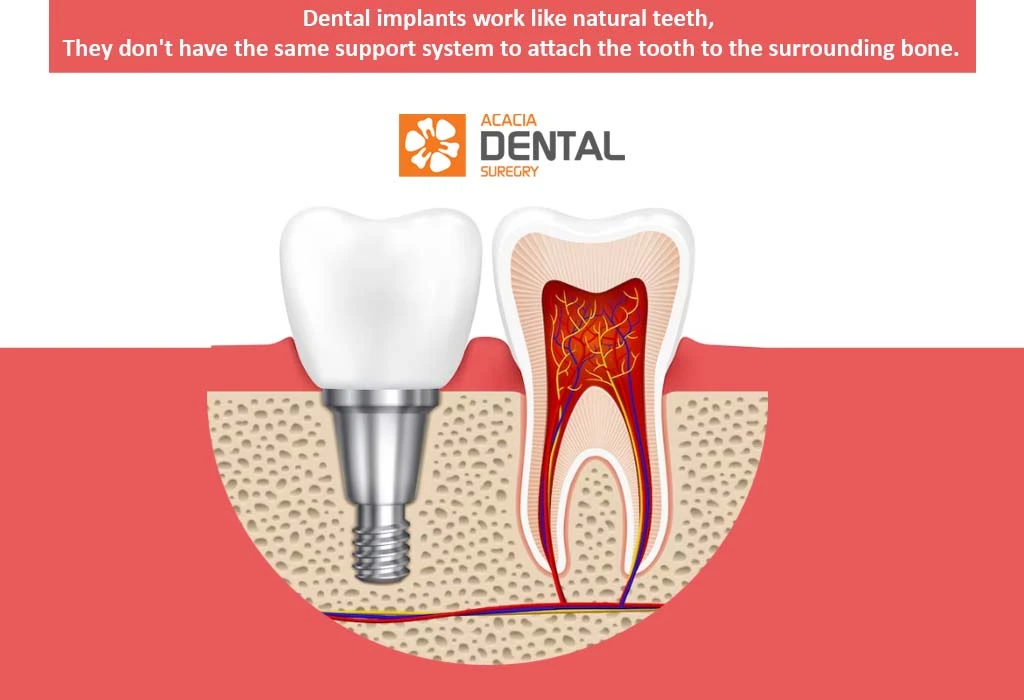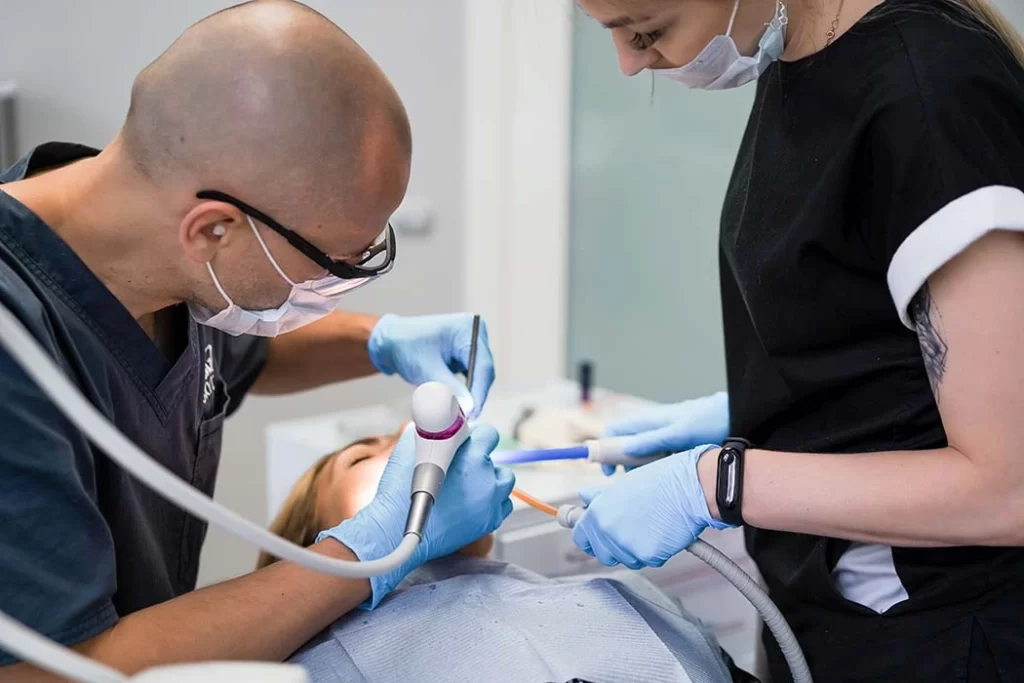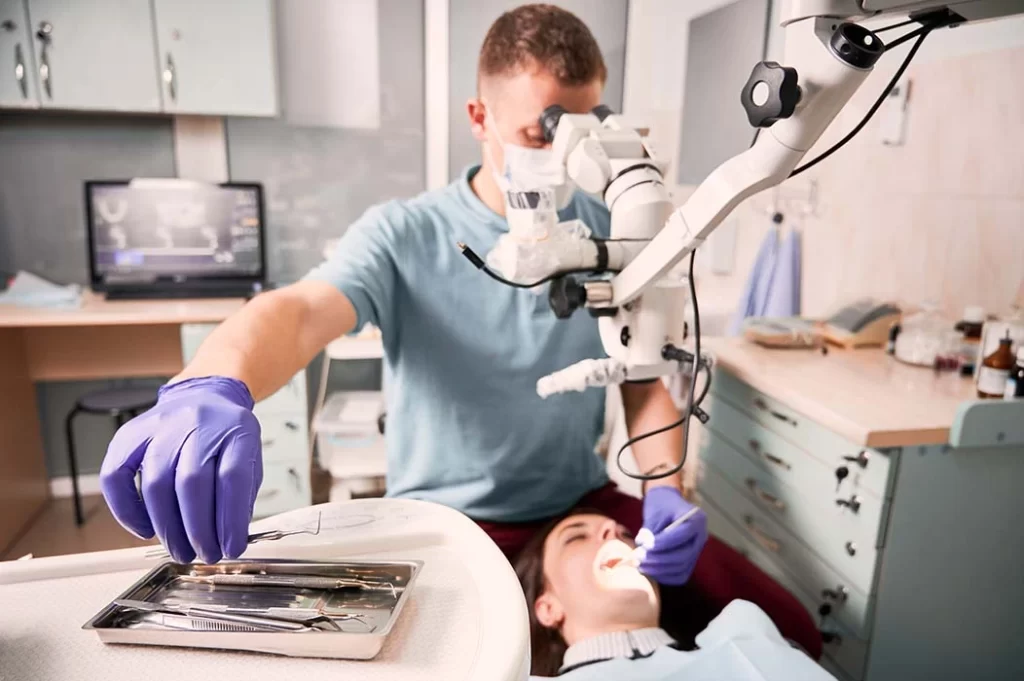However, there is one thing you should be aware of: dental implants can have potential complications such as peri implantitis. Therefore, it is essential to be aware of this dental condition to prevent it from occurring.
What Is Peri Implantitis?
Generally, peri implantitis is a gum disease that might occur after dental implants. This condition is caused by bacteria affecting dental implants’ tissue. If not treated soon, it can lead to inflammation, bone loss, and even implant failure.
You should note that peri-implantitis is not common after dental implants. Almost %20 of people who undergo dental implant procedures may face this condition. However, Smokers, people with diabetes, or people with underlying medical conditions have the highest rates. Furthermore, maintaining oral hygiene can help you avoid facing this problem.
What Causes Peri Implantitis?
Although dental implants work like natural teeth, they don’t have the same support system to attach the tooth to the surrounding bone. If bacteria cause an infection, the gum around the implant may weaken faster than around a real tooth and cause gum disease, known as peri implant disease.

So, let’s see what may cause this to happen:
Poor oral hygiene
Maintaining oral health is the most important thing to consider after a dental implant procedure. If you don’t floss and brush your teeth like your dental routine, plaque and bacteria are made around the implant surface and the surrounding gums. If not removed, they can cause infection and inflammation.
Smoking
As mentioned earlier, smokers are more prone to face peri-implantitis after a dental implant. Because smoking can impair the healing process and reduce blood flow to the implant site, the longer it takes for the implant site to heal, the sooner peri-implant infection is made.
Pre-existing periodontal disease
Gum disease is one of the risk factors that can cause peri implantitis. Therefore, it is crucial to check the patient’s oral health before dental implants. Also, gum disease can affect the quality and quantity of the bone and soft tissues supporting the implant.
Biomechanical factors
If the implant is not placed correctly or is overloaded by excessive biting forces, it can cause bone and soft tissue damage. This can lead to instability and bone loss around the implant. That’s why finding an experienced professional dentist in this dental surgery is essential.

What Are the Signs of Peri Implant?
Some patients can be unaware of having peri implant disease. Even in its first stages, it might not have annoying symptoms. That’s why it is essential to regularly visit a dentist for routine check-ups. Anyhow, symptoms of peri-implantitis may include:
- Swelling or redness on your gum (around the implant).
- Bleeding around the implants.
- Pus discharging from the gum.
- Feeling pain in the gums around the implant.
- Having a bad taste in the mouth.
Treatment of Peri Implantitis
Depending on the severity and extent of the condition, there are different treatment options for Peri-implantitis, from prescribing antibiotic treatment to surgical treatments. Some of these methods include:
Non-surgical therapy
In this method, the diseased and infected tissue is removed from around the implant, called mechanical debridement. It involves cleaning and disinfecting the implant surface and the surrounding tissues with special instruments and antibacterial agents, which can help reduce inflammation and infection.

Surgical therapy
Surgical treatment is usually recommended when the infection is too deep to be removed or cleaned with non-surgical therapy. In this case, the dentist may recommend surgical therapy to remove the infected tissues around the dental implant. This procedure is divided into two types:
- Non-augmentative: In this procedure, the dentist will open the gum flap around the implant to clean and disinfect the implant surface. Then, the soft and hard tissues surrounding dental implants will be reshaped to prevent pockets and defects. In this process, nothing will be added to the implant site, and it will be healed naturally.
- Augmentative: The process of cleaning and disinfecting the implant site is the same in both procedures. However, in augmentative surgical treatment, bone defects are filled with graft material to help the bone and tissue reconstruction. Guided bone regeneration (GBR) is an example of augmentative peri implantitis treatment.
Implant removal
If the peri implantitis is too advanced or has damaged the implant, it will be necessary to remove the implant and replace it with another option.
Bottom Line
Peri-implantitis is a serious condition that can compromise the success and longevity of dental implants. Therefore, it is important to be aware of its signs and symptoms, such as bleeding, swelling, pain, or loosening of the implant, and seek a dentist as soon as possible.
If you seek professional dental care in Darwin and Coolalinga, you can find experienced dentists at Acacia Dental. Furthermore, using our payment methods will make implant costs more affordable for you.
